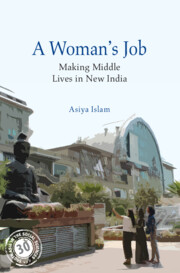6 - Working | Job
Published online by Cambridge University Press: 28 November 2024
Summary
Working
Chitra and Chandni had found their first job together, moved on to a second job together, worked separately for a while and were, at the time I met them, doing ad hoc work and looking for a permanent job together. A few days after her elder sister got engaged, I met Chitra at Select Citywalk. Both Chitra and Chandni were upset; earlier that day, they had travelled to collect payment for a few days’ work that they had done previously. They had managed to get INR 500 but would have to go again to claim the rest of the payment. Chitra was particularly upset because on account of this running around, she had been unable to attend training for a new temporary job that her boyfriend had suggested to her. She felt like she was caught in between – chasing payments was necessary, but it was proving to be a barrier to finding another job.
As we sat outside the mall, basking in the winter sun, Chitra expressed urgency about the need to secure stable employment. In Chitra's family, resources were stretched. She was approaching the final year of her BA programme; she needed support with her studies but did not want to ask her mother for money for private tuition classes: ‘[If] … I could get a job this month, I could join tuition according to the timing.’ Her father was unable to work on account of being blind. Her mother was working in a bank and a few small offices, doing labour-type work, scraping together INR 10,000–11,000 per month. Her brother was working as a driver for a madam, earning a similar amount, but he did not contribute a regular amount to the family, instead using the money as he wished for his ‘drinking and all’. Two of her elder sisters were married and had their own households, but her eldest sister, who lived in a village, had sent her son to live in Delhi with Chitra and her family so he could have better education opportunities. The second sister was, at the time, a housewife, bringing up two young children; her husband did a job normally, helping out in a shop in Malviya Nagar in South Delhi.
- Type
- Chapter
- Information
- A Woman's JobMaking Middle Lives in New India, pp. 130 - 150Publisher: Cambridge University PressPrint publication year: 2025

